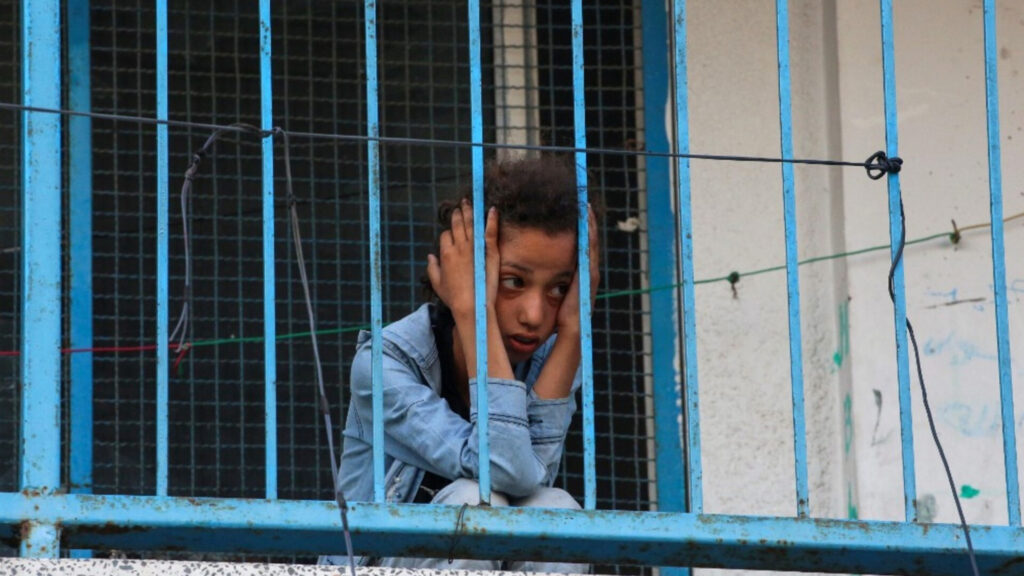Before Israel’s onslaught on Gaza, 19-year-old Layan Abdul-Rahman was ambitious. She spoke English fluently and was getting ready to take the next step toward her future.
However, her studies were stalled by the violence, delaying her university applications by two years.
Now, she has the opportunity to apply online, while grappling with the trauma of losing her father and several family members in Israeli attacks.
“She is mentally exhausted and constantly cries. They have now scheduled an online application next week, but she still cannot believe it. Every day, she comes to me asking, ‘Am I really going to apply?’” her sister, Israa, 33, told Middle East Eye.
On Monday, 2.58 million Israeli students returned to their classrooms to begin the new school year. Of these, 180,600 are starting first grade, while 149,000 are entering twelfth grade, their final year of school.
New MEE newsletter: Jerusalem Dispatch
Sign up to get the latest insights and analysis on
Israel-Palestine, alongside Turkey Unpacked and other MEE newsletters
In Gaza, meanwhile, the education system has been largely levelled by two years of Israeli bombardment.
The UN agency for Palestinian refugees (Unrwa) warned that over 660,000 children in Gaza are being deprived of schooling for a third consecutive year amid Israel’s genocide in the territory.
Analysis of satellite images by the United Nations Satellite Centre in April revealed that 97 percent of schools “sustained some level of damage to their buildings”, with 432 school buildings, 76.6 percent of the total school buildings in Gaza, suffering a “direct hit” since 7 October 2023.
According to the Palestinian education ministry the schooling of around 700,000 has been suspended, with over 70,000 barred from taking secondary school exams in the past two years.
A war on education
The young people valiantly trying to complete their education amid the destruction are doing so while wrestling with psychological trauma and the daily struggle of keeping themselves and their families alive.

Israel used US-made bombs in attacks on Gaza schools, HRW says
Read More »
Abdul-Rahman’s 16-year-old brother, Abdul-Aziz, was once a diligent student enrolled in an Unrwa school.
“Now, he no longer remembers which class he is in,” Abdul-Rahman said. “His interests have changed, he has become career-oriented, focused on finding a profession, and has completely forgotten about his studies.”
Yara Khaled, 40, said that prior to Israel’s genocide in Gaza, her children used to attend the American International School in Gaza and were high achievers. Despite her efforts to compensate for the loss of their education at home, she said “their thinking has completely changed”.
“All their thoughts now are about how to light the fire, whether we have bread, and if they will have a meal the next morning,” Khaled told MEE.
“An entire generation has been destroyed. The war on education is deeper, larger, and more impactful than any destruction of buildings or infrastructure. The war on education is a war on the very existence of the Palestinian people,” she said.
Despite almost all of Gaza’s schools being reduced to rubble, Palestinian-led efforts to provide schooling in makeshift tent classrooms are continuing on the ground.
English teacher Ahmad Abu Rizik set up Gaza Great Minds, an organisation that runs a network of tent schools across the territory, in May 2024.
“In Gaza City, I saw a child with a school bag and he was running,” Rizik told MEE. “I thought that he’s late for class but when I followed him I realised he was running after an aid drop. He was grabbing rice from the sand and trying to put it in his bag. So I said enough is enough I need to do something”.
Healing minds
According to Rizik, the charity runs six of the remaining 50 schools left across Gaza and it is the only organisation to provide education free of charge to some 3,000 children.
“Students come to school hungry. Most of them are thinking about fleeing,” Rizik said. “They are tired from daily chores like standing in queues to get water or to get a sack of flour.
“You can’t find food, water, or even find safety, and you need to hide your screams and tears and try to smile and make the students smile”.
‘All their thoughts now are about how to light the fire, whether we have bread, and if they will have a meal the next morning’
– Yara Khaled, mother
Despite Israel’s intensified assault on Gaza City, Gaza Great Minds is still operating three tent schools in the area.
“The situation is even harder now because Israeli forces are randomly shooting people. They never differentiate between a school, hospital or any residential building,” Rizik said, adding that parents are reluctant to send their children to school amid the violence.
“Our student numbers are decreasing, but we’re still running because there’s a need. As there is a hospital to treat people, there should be a school to heal students’ minds,” Rizik said.
On Sunday, the school lost two of their pupils, Mohammed and Dalia, who were killed while playing in the streets.
“At their funerals, the families described how happy they were at school and that it was a source of hope for them,” Rizik stated.
The schools have lost nine pupils since they opened.
Neve Gordon, the chair of the British Society for Middle Eastern Studies’ Committee on Academic Freedom, said Israel’s levelling of Gaza’s education system is intentional, and will have far reaching implications.
“By decimating Gaza’s educational and intellectual infrastructure and preventing children from accessing schools, Israel is systematically undermining and weakening the Strip’s development for years to come, much after the genocidal violence subsides,” he told MEE.

